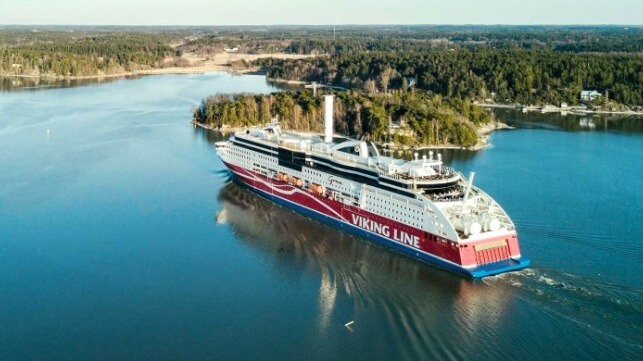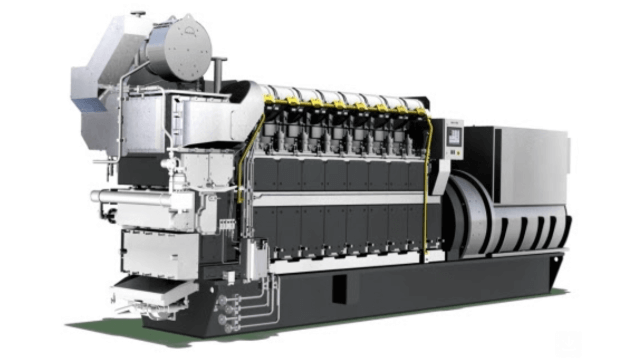ALTERNATE FUEL
Viking Line Sees Improved Supplies of Bio-LNG on the Market

Finnish ro/pax operator Viking Line began offering passengers the opportunity to pay for bio-LNG on its voyages last year, and the possibilities for using this sustainable fuel have been growing, the company reported last week.
"We made sure that Viking Glory, which was completed in 2021, and Viking Grace, which was completed in 2013, were built with the technological readiness to use biogas and synthetic fuels produced from renewable energy," said Viking Line’s Sustainability Manager, Dani Lindberg. "There is now enough biogas being produced in the market so that we can start to use this fuel together with liquefied natural gas for these two climate-smart vessels."
Under Viking's low-carbon pricing program, passengers on the Turku route are offered the option of buying biofuel to cover their journey. This adds a manageable fee of up to €5 in addition to the fare, which ranges between €45-55. The price is based on the typical fuel usage per passenger, and effectively reduces the passenger’s carbon footprint by up to 90 percent. The two passenger ferries make two sailings each day on the same route, and the voyage takes eight to 12 hours depending on the vessel.
Last year, Lindberg said that the local supply of bio-LNG was limited, constraining the amount that Viking could access. Subsidies may be required to expand production, according to the International Council on Clean Transportion (ICCT); with the right policies, 98 billion cubic meters (bcm) of biomethane could be produced in Europe by 2050, according to an industry-backed study for Gas for Climate. This would be enough to replace about 30 percent of current European demand for pipeline gas.
Viking also uses electricity from renewable energy at all of the ports where it uses shore power, which reduces the company’s annual greenhouse gas emissions by about 780 tonnes. Last year it also sold its largest and most emissions-intensive vessel, the M/S Rosella.
For the second time, Viking Line was named the most sustainable company in maritime transport service between Finland and Sweden last year, based on a passenger survey.
Methanol-Fuelled MAN 21/31DF-M GenSet Secures First Propulsion Order

[By: MAN Energy Solutions]
MAN Energy Solutions has received an order for 3 × MAN 6L21/31DF-M (Dual Fuel-Methanol) GenSets capable of running on methanol in connection with the construction of a 7,990 dwt IMO Type II chemical bunker tanker.
The dual-fuel engines will form part of a diesel-electric propulsion system on board the vessel with electrical motors driving twin fixed-pitch propellers via gearboxes; an onboard battery-storage system will optimise the use of the dual-fuelled generators. MAN Energy Solutions’ licensee, CMP – an engine-manufacturing division of Chinese State Shipbuilding Corporation (CSSC) – will build the engines in China and the vessel is scheduled for delivery during Q4, 2025.
The newbuild will operate at the port of Singapore under charter to deliver marine fuels. The port itself is reported as laying plans for the steady supply of methanol from 2025 onwards in order to meet future, anticipated bunkering requirements for methanol-fuelled vessels.
Bjarne Foldager – Country Manager, Denmark – MAN Energy Solutions, said: “Seeing our trusted MAN L21/31 GenSets go into these ships as a methanol-fuelled version shows that maritime decarbonisation is a prominent consideration for shipowners in all vessel segments and sizes. It also clearly illustrates, regardless of the market one serves as shipowner, that our broad, dual-fuel portfolio enables everyone to take part in the green transition.”
Thomas S. Hansen – Head of Sales and Promotion – MAN Energy Solutions, said: “The MAN L21/31 engine is well-established in the market having racked up some 2,750 sales. The reliability of its cost-effective, port fuel-injection concept now prominently positions the 21/31DF-M as the preferred, medium-speed, small-bore engine for GenSet and diesel-electric propulsion solutions, while also meeting market demands to balance both CAPEX and OPEX. With the shipping market currently experiencing an increased interest in methanol as marine fuel, and orders for methanol-fuelled ships steadily growing as part of many companies’ decarbonisation strategy, we feel that the introduction of this dual-fuel engine is timely.”
The products and services herein described in this press release are not endorsed by The Maritime Executive.
No comments:
Post a Comment